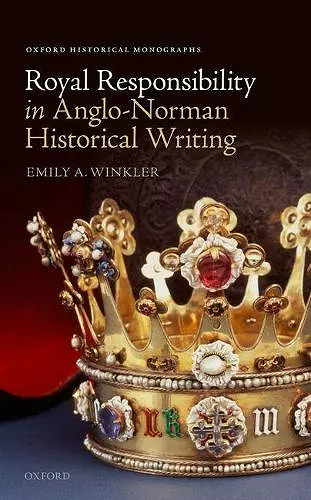Royal Responsibility in Anglo-Norman Historical Writing
Format:Hardback
Publisher:Oxford University Press
Published:26th Oct '17
Currently unavailable, and unfortunately no date known when it will be back

It has long been established that the crisis of 1066 generated a florescence of historical writing in the first half of the twelfth century. Emily A. Winkler presents a new perspective on previously unqueried matters, investigating how historians' individual motivations and assumptions produced changes in the kind of history written across the Conquest. She argues that responses to the Danish Conquest of 1016 and the Norman Conquest of 1066 changed dramatically within two generations of the latter conquest. Repeated conquest could signal repeated failures and sin across the orders of society, yet early twelfth-century historians in England not only extract English kings and people from a history of failure, but also establish English kingship as a worthy office on a European scale. Royal Responsibility in Anglo-Norman Historical Writing illuminates the consistent historical agendas of four historians: William of Malmesbury, Henry of Huntingdon, John of Worcester, and Geffrei Gaimar. In their narratives of England's eleventh-century history, these twelfth-century historians expanded their approach to historical explanation to include individual responsibility and accountability within a framework of providential history. In this regard, they made substantial departures from their sources. These historians share a view of royal responsibility independent both of their sources (primarily the Anglo-Saxon Chronicle) and of any political agenda that placed English and Norman allegiances in opposition. Although the accounts diverge widely in the interpretation of character, all four are concerned more with the effectiveness of England's kings than with the legitimacy of their origins. Their new, shared view of royal responsibility represents a distinct phenomenon in England's twelfth-century historiography.
Winkler not only offers a new perspective on twelfth-century historical writing but also presents that there are new perspectives to uncover regarding the events of the eleventh century and the relationship between them. Ultimately, Winkler's book is an insightful and convincing analysis of how and why twelfth-century historians afforded responsibility to kings; it is well worth reading for those interested in medieval historical writing. * Lucy Moloney, Monash University, ERAS *
an impressive and original first book that has important implications for how we think about historical writing in twelfth-century England, about kingship, and about how medieval intellectuals explained disaster. * Michael Staunton, University College Dublin, Speculum *
ISBN: 9780198812388
Dimensions: 223mm x 148mm x 27mm
Weight: 564g
350 pages